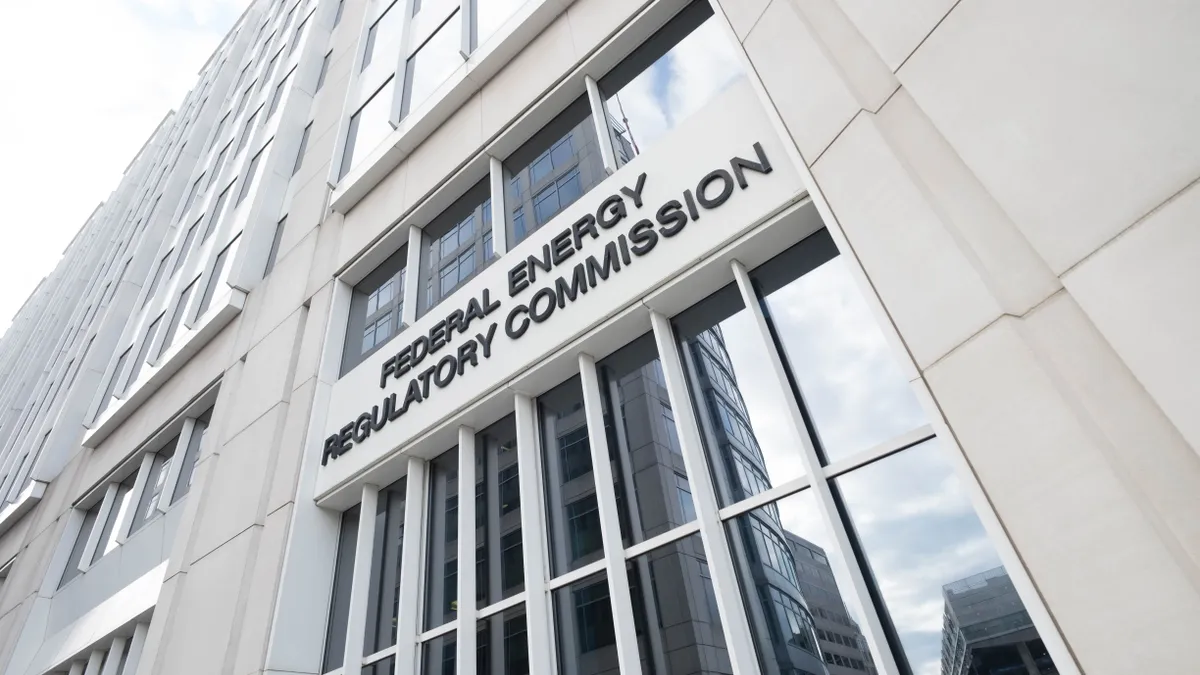Dive Brief:
-
The Federal Energy Regulatory Commission does have the legal authority to implement a carbon price, legal experts agreed during a Wednesday technical conference on carbon pricing.
-
Under sections 206 and 205 of the Federal Power Act, FERC has the authority to actualize such a policy through the regional transmission operators (RTO) and independent system operators (ISO), six panelists spanning academia and industry law told commissioners. But a slightly murkier question is whether the commission has the power to implement such a tariff unilaterally — an issue Commissioner James Danly was particularly interested in.
-
If FERC were to establish a record, there is no "inherent jurisdictional bar" to prevent the commission from issuing a carbon price without a direct request from grid operators, Ari Peskoe, director of Harvard's Electricity Law Initiative, said. Others said it was possible, but tricky without a legislative mandate.
Dive Insight:
FERC's highly-anticipated carbon pricing conference raised a number of questions about the technical feasibility of implementing a carbon price. For Danly, FERC's newest commissioner, only one question was relevant: Does FERC have legal authority to do this?
"The subject that I'm truly interested in right now is the extent of the commission's jurisdiction, what our legal authorities and obligations are," he said in brief opening remarks. "I'm much less interested in the question of implementation. That's something that the filing utilities can work through, and we'll have the opportunity to weigh the merits of those filings, if and when they come."
ISO/RTO tariff designs under the Federal Power Act do indeed allow for FERC to approve such a policy, panelists agreed broadly, and "it potentially could be unjust, unreasonable or unduly discriminatory for [FERC] not to do so," said David Hill, an adjunct senior research scholar at the Columbia University Center on Global Energy Policy. In addition, the U.S. has such policies in place within the California ISO, in New England under the Regional Greenhouse Gas Initiative, and elsewhere, panelists noted.
But part of the consideration depends on who initiates the rulemaking — FERC or the grid operators. The New York ISO is the only grid operator actively pursuing a carbon price, and has been since 2017.
"In terms of fostering or facilitating such policies at the state level, I think that steps beyond the current authority," Roy Shanker, an independent consultant, told the commission. "And that's the line that presumably Congress comes in to solve, by adjusting legislation and redirecting authority and power execution."
Danly pressed this point further in his line of questioning.
"I'm assuming ... from what I've heard that there's nobody on the panel who believes that FERC has the mandate or authority to simply unilaterally impose the universal carbon pricing system," he said. Peskoe countered that he thought the commission did, in fact, have that authority.
"I would be curious to hear any dissenting viewpoints that think that Mr. Peskoe is completely incorrect and that we are, in fact, not able to do that," Danly said.
Shanker said such a move would likely exceed the commission's authority — "it's a lot of bridges too far … you better be able to point to something specifically in the power Act that allows you to do that," he said.
Others were more nuanced.
The commission could potentially reach that conclusion under section 206 of the FPA, which allows a party to file a complaint if it finds a filing with the commission is unjust, unreasonable, unduly discriminatory or preferential, said Matthew Price, a partner at Jenner & Block.
Further, section 202(a), which FERC relied on to create organized wholesale markets in Order 2000, directs the commission to consider "optimization in the efficiency of use of facilities and resources" in its regulation of power supply, and therefore is another statute that the commission could rely on if it were to implement a carbon price on its own, said Price.
Part of the question is whether the action is framed as enhancing competition or with the purpose of regulating the environment more broadly, said Jim Rossi, a professor and chair in law at the Vanderbilt University School of Law.
There is no ruling that indicates FERC should use 205 and 206 for environmental purposes, he said, making the environmental approach "an open question" and potentially "the riskiest approach for FERC to take."
"If the argument is 'This is to reduce barriers to competition and to facilitate a competitive market,' I think you are squarely in your wheelhouse. But if you're drawing on broader purposes of regulating carbon, to protect the environment, that's where I think [the statute] really does raise the question of whether you have that jurisdiction," according to Rossi.















